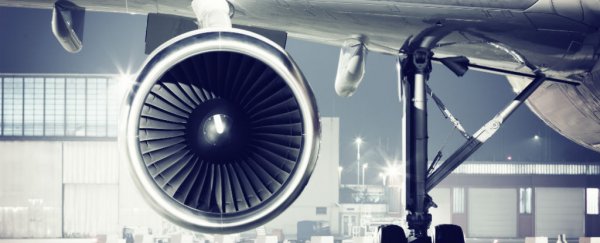When you hear of scientific innovations at airports, they're usually trying to offset the environmental cost of such a necessary and long-haul mode of transportation. Airports and air travel are traditionally loud, expensive, and not too kind on the world we live in, but Boeing's latest idea, according to a recently filed patent, wants to give something back: it floats the idea of harvesting energy from the sound of planes taking off.
As you can see from the patent itself, the idea is founded on a series of "acoustic wave collectors" mounted along the sides of the runway, much like runway lights; as the succession of aeroplanes take off, these collectors turn the sound waves into usable energy. Such a system could be used to light up a runway, for example, or to power the security scanners in a nearby terminal.
"It is well recognised that airports are generate a great deal of noise during aircraft take-offs and landings," writes inventor and Boeing engineer Chin Toh. "This acoustic energy is left to dissipate and represents a lost energy resource. Heretofore, there has been no way to recycle the acoustic energy generated by aircraft during take-offs and landings. Accordingly, there is a need for a method and system to harvest the free acoustic energies available at airport runways for electricity generation."
Here's how it works: the sound waves coming into the acoustic collectors are directed to an acoustic converter assembly. The vibrating element inside moves in response to the roar of the jets, drawing air into the housing underneath and then forcing it outwards - this outward flow is put to work powering a turbine and electricity is produced at the other end.
What we don't know is just how efficient or powerful such a system would be. As Kelsey Campbell-Dollaghan from Gizmodo points out, the energy that can be harvested from sound waves represents only a fraction of the potential of solar power. Even noise that sounds deafening to us doesn't have that much inherent energy inside it, which is why scientists have tended to focus on other sources of renewable energy up to this point.
That's not to say that acoustic sound collection doesn't have potential though, particularly when that sound causes vibrations in the surrounding environment. "It's perfectly conceivable to absorb [those vibrations] and glean useable energy," writes David Cohen-Tanugi, vice president of the MIT Energy Club. "You're not going to power a city with it, but you can power small devices."
As with any patent, this only represents part of Boeing's thinking and future planning - the idea might never become practically viable or might change in scope and design along the way - but if there is a way to utilise the energy coming from the sound of your aeroplane taking off, Boeing's engineers are doing their best to find it.
